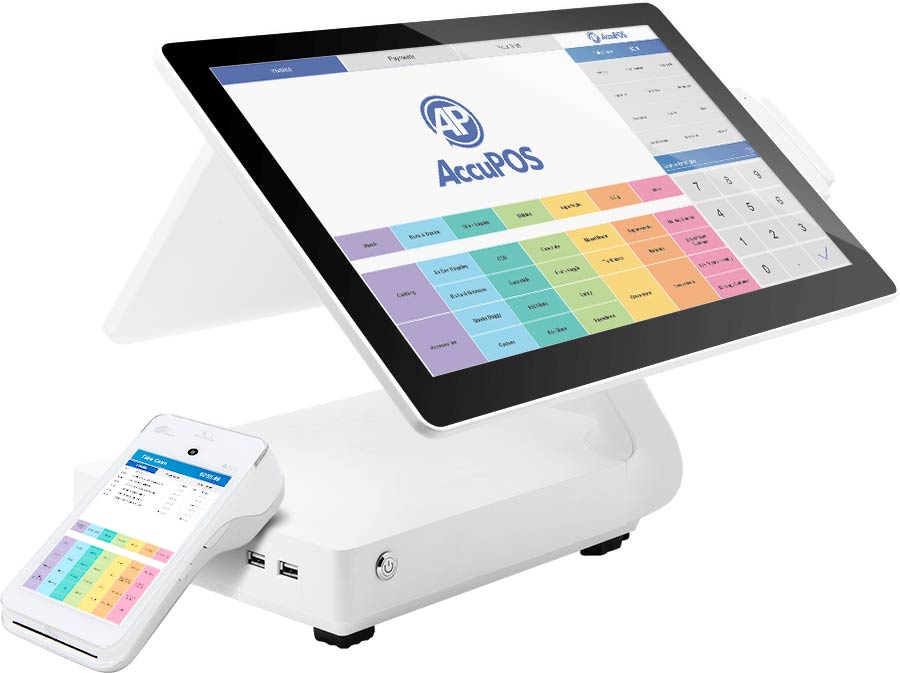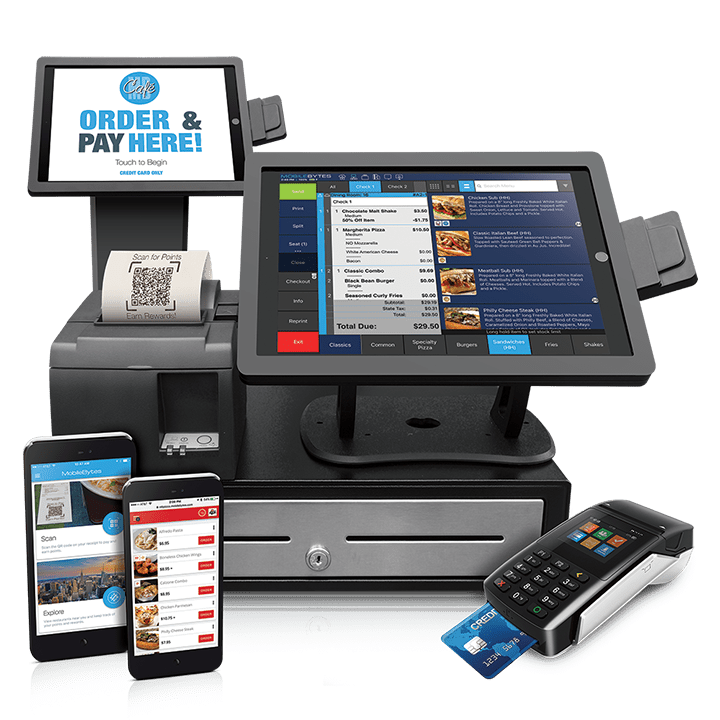Our Point Of Sale Systems Statements
Our Point Of Sale Systems Statements
Blog Article
Fascination About Clover Pos

Point of Sale: Retail Point-Of-Sale Solutions Streamline Transactions
Pos for Dummies

Hardware Elements of a Point of Sale System What makes a POS system tick? It's not just software application; the hardware plays a starring function. Consider it as the body to the software's brain. Without the best hardware, even the most advanced POS software application is simply a quite face. Necessary POS Hardware So, what are the must-haves? Let's simplify. The central processing system, often a computer system or tablet, is the heart of the operation. The monitor or touchscreen show allows staff to interact with the system. A barcode scanner speeds up the checkout process. Keep in mind the days of manually getting in each code? The trusty invoice printer provides consumers with a record of their purchase. A money drawer keeps your cash safe and arranged. A card reader enables clients to pay with credit or debit cards. Diving Deeper: Beyond the Basics However wait, there's more! Depending upon your service, you might require specific hardware. A dining establishment may integrate kitchen printers to relay orders, while a retail store may utilize label printers for item tagging. Ever wonder how your regional bakery immediately prints those delicious-looking labels? Choosing the Right Hardware: A Balancing Act Picking the ideal hardware isn't just about buying the most expensive equipment. It has to do with finding the sweet spot in between performance, sturdiness, and spending plan. A small company simply beginning read more may opt for a more basic setup, while a high-volume seller will require robust, high-performance machines. Is it much better to purchase brand-new or utilized? Consider your alternatives carefully. A new system provides the newest technology and service warranty security, but a reconditioned system can conserve you cash. The Future of POS Hardware What does the future hold? Anticipate to see even more integration with mobile phones, biometric scanners for staff member authentication, and advanced analytics control panels showed on larger, clearer screens. Think of a world where inventory is instantly updated in real-time as products are scanned-- a world where you can track your best-selling product from throughout the world. The possibilities are unlimited, and the hardware is continually evolving to satisfy the demands of today's businesses. Are you prepared to update your point of sale system?
Software Application Characteristics and Capabilities: The Heart of Your POS System
Ever enjoy a seasoned barista move through a busy early morning rush? Their secret isn't just caffeine; it's a seamless dance with their POS system. The software application is the conductor of your organization symphony, managing whatever from sales to stock. But what notes should you be listening for? What abilities truly matter in today's market?
Inventory Management: Beyond Counting Beans
Forget spreadsheets that haunt your dreams. Modern POS systems use real-time inventory tracking, informing you when your stock of artisanal coffee beans dips precariously low. Believe of it as a digital guardian angel, avoiding those uncomfortable "Sorry, we're out!" moments to consumers. What if you could also predict demand based upon historic data? Many systems now use forecasting tools, a powerful weapon versus overstocking and lost sales. This helps avoid the dilemma of running out of popular items or accumulating excess stock of slow-moving items, both of which can constrain capital and space.
Sales Reporting and Analytics: Decoding the Data
Sales data is the brand-new gold, and your POS system is the miner. Forget simply knowing just how much you sold today. Dive deep into the information to discover patterns, determine your very popular products, and understand client behavior. Which menu item pairs perfectly with the daily special? Which promotion resonated most with your clients? These insights are not just interesting; they're actionable intelligence. Without reputable sales reporting, navigating the intricacies of company decision-making ends up being like sailing without a compass, increasing the opportunity of mistakes and missed opportunities.
Consumer Relationship Management (CRM): Structure Bridges, Not Walls
Remembering a routine consumer's name and preferred order is captivating, but scaling that individual touch is challenging. POS systems with CRM abilities permit you to track consumer purchase history, preferences, and even birthdays. Think of instantly offering a discount rate on their birthday-- a little gesture that fosters loyalty and encourages repeat business. But there is the possible snag of bad information quality, which can cause inaccurate client profiles and ineffective marketing efforts.
Payment Processing: Simplifying the Deal
The checkout experience can make or break a sale. Seamless combination with different payment approaches-- credit cards, mobile wallets, even copyright-- is non-negotiable. Can your system handle split payments? Does it offer safe tokenization to protect client information? A clunky payment process resembles striking a sour note in your business symphony, potentially interfering with the whole performance. Making sure compatibility with progressing payment technologies and adherence to security requirements are critical for maintaining customer trust and operational efficiency.
Employee Management: Keeping the Team in Sync
From clocking in and out to managing permissions and tracking performance, employee management features streamline operations and enhance accountability. Is scheduling a problem? Many POS systems offer incorporated scheduling tools, optimizing staffing levels based upon predicted need. A typical challenge that is typically ignored is the difficulty of integrating staff member management functionalities with payroll systems, which can cause mistakes and inadequacies in wage estimations.
Advanced Characteristics: Leveling Up Your Operations
- Table Management: Perfect for dining establishments, this function allows you to envision your dining-room, track table status, and manage reservations.
- Loyalty Programs: Reward your best clients and encourage repeat company with integrated commitment programs.
- Online Purchasing Integration: Seamlessly incorporate your POS system with online purchasing platforms to expand your reach.
Picking the ideal POS system has to do with more than just performance; it's about finding a partner that can grow with your service. Consider your current needs, anticipate future development, and don't be afraid to ask the hard questions. The right software application can transform your business from a disorderly cacophony into an unified work of art.
Industry-Specific POS System Applications
Think about the local pastry shop, busy with morning customers craving fresh croissants. A generic POS system might deal with transactions, however can it handle intricate dishes, track active ingredient stock, or instantly change production schedules based upon sales data? Probably not. That is where the charm of industry-specific POS systems shines.
Restaurants and Hospitality
For bustling restaurants, speed and accuracy are paramount. How many times have you seen servers managing orders, adjustments, and splitting bills, all while attempting to supply exceptional service? A restaurant POS system simplifies these processes, allowing for table management, kitchen area order tickets, and even online ordering integration. These systems typically consist of functions like ingredient-level stock tracking, vital for handling food costs and reducing waste. Ever wonder why your preferred dish is often not available? It might originate from an absence of appropriate stock management.
- Table Management
- Cooking Area Order Tickets
- Online Buying Integration
- Ingredient-Level Inventory Tracking
Retail Solutions
Retail, with its diverse inventory and customer interactions, requires a various set of tools. Think of a store clothing store struggling to keep track of sizes, colors, and seasonal collections using a standard checkout system. An industry-specific retail POS system uses functions like barcode scanning, client loyalty programs, and detailed sales reporting. These systems can even integrate with e-commerce platforms, providing a seamless omnichannel experience for consumers. Did you know some retail POS systems can predict future sales trends based on historical data? Now that is effective!
The Perils of an Inequality
Selecting the incorrect POS system can develop considerable operational hurdles. A clothes boutique utilizing a dining establishment POS, for instance, would find it inappropriate for managing stock with sizes and colors. The absence of proper reporting and analytics might lead to misinformed buying decisions and lost profits. The outcome could be similar to trying to fit a square peg in a round hole.
Secret Factors to consider
Selecting an industry-specific POS system needs mindful assessment. Think about your business's unique requirements and functional workflows. Does the system incorporate with existing software? Does it use the required reporting abilities? Is it scalable to accommodate future development? A well-chosen POS system is not just a deal tool; it's a tactical asset that can drive effectiveness, improve consumer complete satisfaction, and eventually, boost your bottom line. Keep in mind, it is an investment in your company's future, not simply an expenditure.
Security Factors To Consider for Point of Sale Systems
Ever heard the tale of the mom-and-pop store that lost whatever because of a single, neglected security flaw in their POS system!.?. !? It's a cautionary tale, and it highlights a vital aspect often overshadowed by the allure of elegant functions and structured operations. The reality is, a POS system is just as excellent as its security. What good is a system that crunches numbers in a flash if it enables crooks to swipe customer's information just as quickly?
The Vulnerability Minefield
The digital landscape is a battlefield. Every POS system, despite size or sophistication, is a possible target. Are you truly prepared for the risks prowling around the corner? The genuine pinch comes when you find that your outdated software application has an open hole that hackers can make use of, turning your business into an unwitting accomplice in identity theft. The difficulty is that hackers are crafty and are always altering their techniques.
Common Security Spaces and Specialist Tips
- Weak Passwords: "Password123" isn't cutting it. Use strong, unique passwords for all POS system accounts and alter them regularly. Two-factor authentication is a must.
- Unsecured Networks: Your Wi-Fi is like leaving the front door open. Protect your network with strong file encryption (WPA3 if possible) and consider a separate network for your POS system.
- Out-of-date Software Application: Software application vendors patch security holes all the time. Stopping working to update is like welcoming difficulty. Set up automated updates or schedule routine upkeep.
- Worker Training: Your personnel is your first line of defense. Train them to recognize phishing attempts, safeguard passwords, and report suspicious activity.
Information File Encryption: Your Guard Against the Dark Arts
Consider information file encryption as a secret code. It scrambles delicate info, like charge card numbers, making it unreadable to unauthorized users. Without encryption, your clients' financial details resemble sitting ducks, ripe for the picking by cybercriminals. It's not almost safeguarding your customers; it's about protecting your credibility and preventing significant fines.
PCI Compliance: The Rulebook You Can't Overlook
If you accept charge card, you're bound by the Payment Card Industry Data Security Standard (PCI DSS) It's a set of security requirements designed to secure cardholder data. Failing to comply can result in fines, penalties, and even the loss of your capability to process credit card payments. It's a headache, yes, however it's a required one. Think about PCI compliance as the expense of doing service in the digital age.
Consider this: every deal processed through your point of sale is a prospective entry point for destructive stars. By implementing robust security measures, you're not simply protecting your business; you're securing your clients' trust and ensuring the long-term viability of your operations. The security of your POS system isn't just a technical problem; it's a service necessary. It needs continuous alertness, proactive measures, and a dedication to staying ahead of the curve.